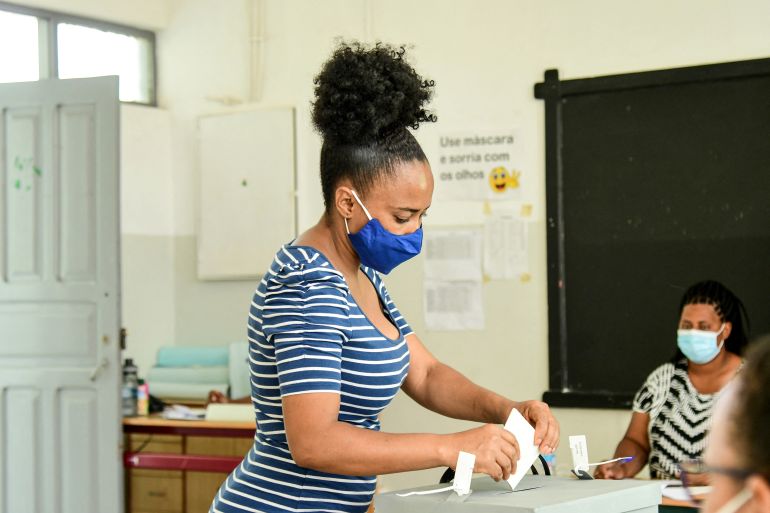Cape Verde presidential election: What you need to know
A record seven candidates are running, with two former prime ministers – Carlos Veiga and José Maria Neves – seen as the strongest contenders.

Voters in the island nation of Cape Verde are set to cast ballots on Sunday to elect the country’s next president.
The polls mark the end of the second and last mandate of Jorge Carlos Fonseca, the fourth president in Cape Verde’s history, since the country’s independence from Portugal in 1975. A second round of voting is provisionally scheduled for October 31, if no single candidate receives a majority.
Keep reading
list of 3 itemsCape Verde holds parliamentary vote amid major recession
A boxing club shaping lives through social integration
This will be the seventh round of elections since Cape Verde’s transition to free and multiparty elections in 1991. The 10-island archipelago off West Africa’s coast is often praised as an exemplary democracy in the continent, as it continues to rank high amongst indexes of transparency and political freedom.
A record seven candidates are running – but the strongest contenders are two former prime ministers: Carlos Veiga, supported by the Movement for Democracy (Mpd) and the Democratic and Independent Cape Verdean Union (UCID); and José Maria Neves, running with support from the African Party for the Independence of Cape Verde (PAICV).
Both Mpd and PAICV have dominated Cape Verde’s political scene for decades, having been key players in the country’s struggle for independence and its aftermath – which remains a key mobilising factor in today’s electoral campaigns.
“In parliamentary elections, MpD and PAICV aggregate just over 90 percent of all votes, and almost all parliamentary seats,” explains Edalina Sanches, an assistant professor in African Studies at the University Institute of Lisbon, and author of Party Systems in Young Democracies.
The frontrunners
The two main challengers, who have garnered most of the media attention throughout the electoral campaign, have pledged to bring stability and consensus to face the effects of the COVID-19 crisis on a country that relies heavily on tourism.
Veiga is often praised for his role in helping build the constitution, as one of the founding members of the MpD, a party that played a central role in Cape Verde’s transition to democratisation. The 71-year-old, whose role as an ambassador to the United States ended in 2020, held office as prime minister between 1991 and 2000.
Neves, meanwhile, was elected as prime minister in 2001. He went on to hold the longest mandate in the country’s history, being elected three consecutive times until 2016. The 61-year-old is the former president and deputy of PAICV.
Cape Verde has a semi-parliamentary system where the prime minister holds executive power and the president acts as a head of state, taking the role of a mediator.
“The president’s role is far from being a merely ceremonial one,” said Sanches, noting it often lies in advocating for consensus in crucial decisions and intractable disputes, guaranteeing stability and protecting the constitution.
“Presidents will not implement public policies, but they have the power to veto laws, to supervise government initiatives,” added Sanches.
The issues
Cape Verde continues to battle an economic recession after output shrank by 14.8 percent in 2020, partly due to the country’s dependence on tourism, which accounts for 25 percent of the economy.
In July, Olavo Correia, the finance minister and deputy prime minister, told parliament the country was going through the biggest “economic, financial and budget crisis of its history”.
In the lead-up to Sunday’s vote, political discussions have focused on a range of issues, including urban violence, the need for a nonpartisan public sector and the diversification of the economy.
“The debates have not been about electoral promises but rather about promises to influence the resolution of key issues – from justice to health, and the role and independence of the president in these issues,” said Sanches.
Voters abroad
Cape Verde’s large diaspora, often referred to as the archipelago’s “eleventh island” represents an important share of the vote, as foreign remittances make up 12.1 percent of the country’s gross domestic product (GDP).
Approximately 500,000 people live on the islands, while it is estimated that more than 700,000 live abroad, predominantly in Europe and the United States.
However, observers caution that abstention is traditionally higher abroad and expect this trend to continue, with only about 57,000 voters registered outside Cape Verde.
Abstention rates, however, are not a problem reserved solely for emigrated Cape Verdeans – the previous presidential election registered a resounding abstention rate of 64.5 percent.
But Sanches believes the number of contenders this year and the presence of candidates such as Veiga and Neves are “extremely mobilising”, which may counter this recent trend.
Still, the historical legacy of the main contending parties may begin to lose ground, particularly among the country’s younger population, who often do not feel incentivised to participate in the electoral cycle.
Redy Lima, a sociologist working in Cape Verde’s Institute of Social and Legal Sciences, believes the issue lies partly in the disillusionment that many youth feel, particularly due to a lack of work opportunities and the recent growth in unemployment.
Despite younger Cape Verdeans often being involved with rallies and even campaigning for political parties, this has not reflected in voter participation in recent elections.
“Young people have been socialised in a completely different context,” said Sanches. “It is important that these parties can remodel and adjust to present conjectures, responding to the needs of the country’s youth, that make up an important sector of the population.”